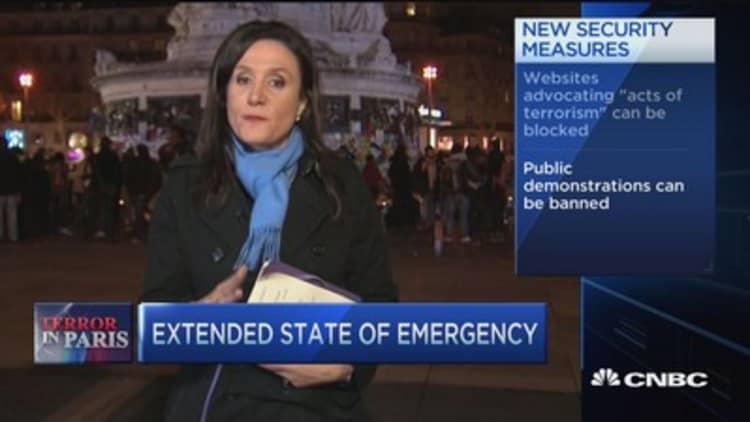
The benefits and drawbacks of social media have been debated since the technology was born. But in an emergency situation conditions change and security tightens, begging the question: Should there be restrictions placed on social media in a crisis situation?
Andrew Selepak, director of the social media master's program at the University of Florida thinks social media is actually a valuable tool during an emergency such as the recent Paris attacks.
Selepak told CNBC's "Power Lunch" on Friday that social media was the way people around the world found out about the events in Paris. Moreover, people on Twitter used the hashtag Porte Ouverte to inform others of safe places to go during the attacks.
"Safety Check on Facebook allowed people to let loved ones and friends know that they were safe, that they were OK," Selepak said. "Facebook and Twitter had such an important role in terms of just bringing people together after the event that I think suspending it would be not necessarily the best move in terms of public safety."

At the same time, social media is being used heavily by terror groups like ISIS not only to communicate but also to recruit new members.
"We know there's been over 66 individuals in the United States that have been indicted for some type of action related to ISIS and 80 percent of them were recruited via social media," said former FBI Assistant Director Chris Swecker. "But I don't see [the government] suspending First Amendment rights unless we're really, really in an extraordinary set of circumstances."
In a near-unanimous vote on Friday, French lawmakers sanctioned greater security power for the government. One of the provisions of the legislation allows authorities to block websites "advocating acts of terrorism."
Swecker said that the government might selectively shut down certain online avenues if a particular social media site posed a clear and present danger, such as serving as a mode of communication among terrorists
However, Selepak said it's not necessarily the government's job to censor online activity, but rather it's up to social media users to monitor and report malicious speech.
"You can do this through individuals. … You can report this type of content to Twitter, to Facebook to have it removed," said Selepak. "You will see that there's a lot of different individuals and groups that are participating and trying to prevent, say ISIS from recruiting new members. A big campaign has been going on by Anonymous shutting down Twitter accounts, shutting down other social media accounts to prevent ISIS from recruiting new members."
This week, hacker group Anonymous posted a video declaration of war against ISIS.
"Expect massive cyber attacks. War is declared. Get prepared," an Anonymous spokesperson said in French. "Anonymous from all over the world will hunt you down. You should know that we will find you, and we will not let you go."





